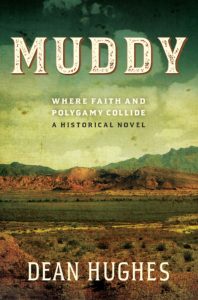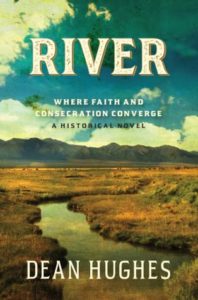 Author: Dean Hughes
Author: Dean Hughes
Title: Muddy: Where Faith and Polygamy Collide
Deseret Book, 2019. 384 pages.
(Reviewed by Michelle Llewellyn)
Not much has been written in Church literature about “the principle” or the practice of plural marriage among early members of The Church of Jesus Christ of Latter-day Saints. Gerald Lund’s Work and the Glory series-Volume 6: Praise to the Man (1995) or going back even further to The Bishop’s Horse Race (1979) by the Yorgason brothers (whatever happened to them anyway?) are probably the closest fictional accounts we have. A reader would be hard-pressed to find any novel, LDS published or otherwise, out there worth reading that includes a church member’s view of the issue presented in a positive way. As if there were some unwritten rule for LDS authors to never touch it and LDS publishers (such as Desert Book) to hesitate in gathering any stories and publishing them so the public (and even members of the church) might have a better understanding of this mysterious practice.
So it is with great anticipation readers desiring a new point of view that portrays such a chapter in Church History most leaders and members would rather avoid, in a dignified yet entertaining way should pick up this newest novel by celebrated LDS author Dean Hughes and read it.
The story begins around 1865 when the prophet Brigham Young himself calls 22-yr old, single, never-married, Morgan Davis from Farmington, UT into his Salt Lake City office to issue a calling for him to travel hundreds of miles south and help settle the desert areas of Southern Utah/Nevada where many members are living the principle so they might better “multiply and replenish the earth.”
Almost before he knows what’s happening, young Morgan finds himself accepting the calling.
Oh, and he’ll also need to find a wife and get hitched before he leaves.
Morgan gulps and exits the office….
This story is a page turner from the very start!
It does get slow in the middle as these saints struggle to tame the land and live normal lives in triple-digit heat. Modern readers may be disappointed the women aren’t more outspoken, demanding education and job opportunities to work outside the home instead of stuck being somebody’s (second or third) wife and mother to a brood of troublesome children. As if they had time to think about such things with no Wal-Mart nearby to provide all their basic needs, air conditioning or indoor plumbing to make life easier so they might have more time to read Betty Friedan. As the author comments in a recent “All-in” podcast-views of marriage and the reasons for getting married back in those days were not the same as the family formation ideas being debated now.
Past historical fiction novels by this author have always contained some good character arcs and development which struggles in places here, but a sequel is coming! Those who haven’t picked up a Dean Hughes’ book in a while will find his writing style is just as enjoyable to read as his past books.
Overall this was a very enjoyable read with nothing offensive aside from some comments by the characters about the roles of women, men and following a prophet for the right reasons. Readers will find themselves rooting for Morgan and his wife. (Wives? Read the book and find out!)
 Author: Dean Hughes
Author: Dean Hughes
Title: River: Where Faith and Consecration Converge (Muddy #2)
Deseret Book, 2020. 384 pages.
It would be a good idea to read the first book, Muddy before picking up this one so the reader will understand why a group of Latter-day saints in the the late 1800’s decided to relocate to a place called Long Valley where the current-day town of Orderville, Utah is now located. It would also be a good idea to be familiar with the characters of the fictional Davis family as they face new challenges of living the Law of Consecration and Sacrifice along with the foreshadowing that Morgan might just take a third wife and the character arcs this will create that this author is so good at writing.
I loved reading this book. The fact that a family member loaned it to me during the COVID lockdown when nearly everything was closed and I literally had nothing to read…well, this book saved my life. The shout-outs in the narration to the towns of Hurricane and Toquerville were especially fun to read as I spent part of my life in those areas (Hurricane High class of ’93) and wished I could step into these pages of history and see what the area looked like during these “ancient times” as Morgan was passing through on his way to St. George to sell goods and foodstuffs for profit which was then shared with his community and did not have a Utah State Route 9 to travel on.
I knew the story of the “Orderville Pants Rebellion” would be in here (chapter 15) as I had read it somewhere before. The story goes that while everyone had to share everything equally, including obeying a dress code, a young, enterprising young man, figured out a way to make some extra money to purchase his own pair of machine-made pants, like the boys in other towns were wearing. This caused quite a stir among the young folks in Orderville. Morgan is on the disciplinary council for this young man and his pants and it is quickly becoming apparent, this way of living can’t last forever.
The subject of polygamy continues to be developed and the questions Dean Hughes forces us to ask ourselves as we read about the enforcing of the Edmonds-Tucker Act (read Saints Vol II also!) is another reason I enjoyed this sequel. There is a scene in chapter 14 where Morgan takes two of his sons, ages sixteen and twelve, to a town meeting to discuss how they will handle the enforcement of the new law. On the walk home, his sons question why non-members and government leaders back east have such a problem with their way of living. The children are all being cared, provided for and loved, each wife is treated equally and, at least for their family, they are all one big happy family-almost Celestial. What’s the big deal? They are not hurting anyone.
WOW
Just wait about a hundred years, boys, and see how much everything gets turned on its head as evil is now called good and good evil!
As a child of divorce now grown and still single, with parents who married in the temple, it is fascinating from a sociological standpoint to read in fiction about a different kind of dissolving of these “unnatural family units” and today’s utter lack of family formation. Are today’s family units really more successful than the ones portrayed in this book? I liked how a bishop explains it to Morgan in chapter 11: he and HIS three wives do their best to have “three marriages in one” but, as Morgan’s wife Angie continues to point out to her husband, as First Wife, living the principle is just plain DIFFICULT for women while the men have it easy (And she’s right, just look at any singles ward in the church today!) no matter how much these married men whine over how to divide their time equally between their wives it is still the women who must make the greater sacrifice.
This author isn’t afraid to tackle such delicate subjects.
It leaves a reader like me asking, “If I had to choose between living in a community where divorce and monogamous adultery was nonexistent with all children growing up in homes with a first-time married mother, a committed father (and one or two more surrogate mothers) with everyone united, pulling together so they can work it out, always there for each other, nobody alone (you just can’t make it), everyone living the principles of the gospel, raising their children to be kind and unselfish, but with no modern conveniences, versus the world we live in today with all its luxury and 21st century living but with singles wards: men (and women) who are lovers of their own selves, the competition, the lack of sacrifice, all the broken homes. Would I truly want to live alone, single, with all our modern luxuries of electricity and air conditioning and the internet, knowing I must continue to wait for some future mysterious day in some other future existence where I will, at last, have that opportunity to create an eternal family of my own and raise up children in righteousness?
Which way of living would YOU prefer?
Isn’t it too bad we can’t have both.
